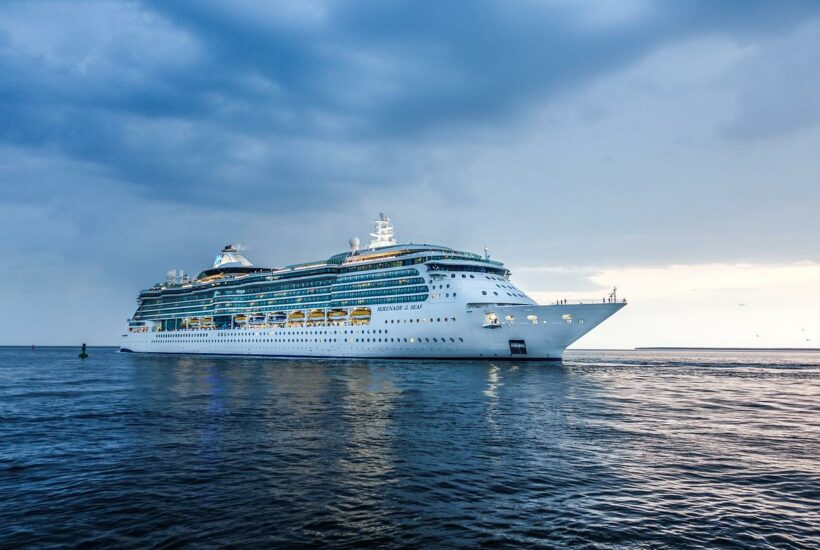Featured
Cruise Ships Still ‘Shipwrecked’ in the Sea of Sustainability
The four major shipping companies are increasing their efforts to become more sustainable, after the critics addressed to Royal Caribbean. Norwegian also has 2050 as its goal to be emissions neutral. In its new sustainability report it commits to offsetting three million metric tons of CO2 equivalent in three years and wants around 70% of its fleet to be equipped by 2025 to connect its ships to shore-side power grids.

The Wonder of the Seas, owned by Royal Caribbean and considered the largest cruise ship in the world, left on his last visit to the Balearic Islands a trail of criticism and toxic smoke that pollutes “almost 10 times more than all the cars in Palma de Mallorca together,” denounced the anti-cruise platform.
Since the NGO Transport & Environment put figures to the pollution emitted by these vessels (the equivalent of 100 million cars), the four major shipping companies, Carnival, Royal Caribbean, Norwegian Cruise Line, and MSC Cruises, are redoubling their efforts to reduce their emissions.
In its latest ESG report, which brings together environmental, social and governance metrics, Royal Caribbean CEO Jason Liberty noted that they are focused on “delivering the best possible vacations while doing so in a responsible way” and put the focus on achieving zero emissions by 2050 with actions such as the introduction of a fuel cell hybrid, a shipbuilding portfolio in which each new class of ship is 20% more energy efficient than its predecessor or managing waste to convert it into energy.
Read more on the subject and find the latest financial news of the day with the Born2Invest mobile app.
Royal Caribbean, Carnival and Norwegian offer a medium level of unmanaged sustainability risks
Norwegian also has 2050 as its goal to be emissions neutral. In its new sustainability report it commits to offsetting three million metric tons of CO2 equivalent in three years and wants around 70% of its fleet to be equipped by 2025 to connect its ships to shore-side power grids.
Despite these good intentions, the truth is that ESG ratings do not yet reflect these intentions. Excluding MSCI Cruises, which is not listed, the other three shipping lines receive a rating of more than 20 out of 100 from Sustainalytics, which means a medium level of unmanaged sustainability risks (between 0 and 10 these risks are negligible and above 30, high). The worst is Norwegian, with 26.6.
S&P Global (where the higher the number from 0 to 100 means a better grade) gives Carnival a 40, Norwegian a 41 and Royal Caribbean a 56. And for MSCI, which designates leaders in ESG risk management with triple A or double A, it grades Carnival with a B, Royal Caribbean with a double B and leaves Norwegian without a grade.
The recommendation is hold
Despite the good numbers forecast for tourism in what is expected to be the year of consolidation of the post-pandemic recovery, cruise companies are being caught up in a perfect storm on the stock market, with annual declines of more than 50% on the stock market. These declines have brought to the surface nearly triple-digit 12-month potential, which, on the other hand, has not changed the consensus analysts’ minds, who recommend holding their stocks until the storm subsides.
“High fuel prices, inflationary pressures on food, and significant increases in costs for cruise ships to reach their port of departure are incremental hits on margins,” Deutsche Bank noted.
In the case of Royal Caribbean, these experts believe that “there remains solid operating momentum in the here and now and the company is trending towards a much more comfortable cash position, but obviously the markets are at this point more focused on potentially less rosy economic scenarios for the U.S. consumer for the coming year.”
Indeed, the German bank’s analysts believe that “until one of the cruise operators is willing to offer formal guidance for 2023, we believe the path of least resistance for many consumer discretionary investors is to stay on the sidelines.”
Less pessimistic is Citi on Norwegian, for whom while it remains rated neutral/high risk given its exposure to geopolitical events and changing pandemic conditions, “if the company can simply achieve some stability on these fronts, we should see substantial improvement across the board in the coming months,” he said.
__
(Featured image by addesia via Pixabay)
DISCLAIMER: This article was written by a third party contributor and does not reflect the opinion of Born2Invest, its management, staff or its associates. Please review our disclaimer for more information.
This article may include forward-looking statements. These forward-looking statements generally are identified by the words “believe,” “project,” “estimate,” “become,” “plan,” “will,” and similar expressions. These forward-looking statements involve known and unknown risks as well as uncertainties, including those discussed in the following cautionary statements and elsewhere in this article and on this site. Although the Company may believe that its expectations are based on reasonable assumptions, the actual results that the Company may achieve may differ materially from any forward-looking statements, which reflect the opinions of the management of the Company only as of the date hereof. Additionally, please make sure to read these important disclosures.
First published in elEconomista.es, a third-party contributor translated and adapted the article from the original. In case of discrepancy, the original will prevail.
Although we made reasonable efforts to provide accurate translations, some parts may be incorrect. Born2Invest assumes no responsibility for errors, omissions or ambiguities in the translations provided on this website. Any person or entity relying on translated content does so at their own risk. Born2Invest is not responsible for losses caused by such reliance on the accuracy or reliability of translated information. If you wish to report an error or inaccuracy in the translation, we encourage you to contact us.

-

 Impact Investing2 weeks ago
Impact Investing2 weeks agoIntesa Sanpaolo’s 2026–2029 Growth and ESG Strategy
-

 Business3 days ago
Business3 days agoTopRanked.io Weekly Affiliate Digest: What’s Hot in Affiliate Marketing [Health Trader Affiliate Program Review]
-

 Business1 week ago
Business1 week agoTopRanked.io Weekly Affiliate Digest: What’s Hot in Affiliate Marketing [Hosting.com Affiliates]
-

 Crypto5 days ago
Crypto5 days agoEthereum Pushes AI Integration With ERC-8004 and Vision for Autonomous Agents














